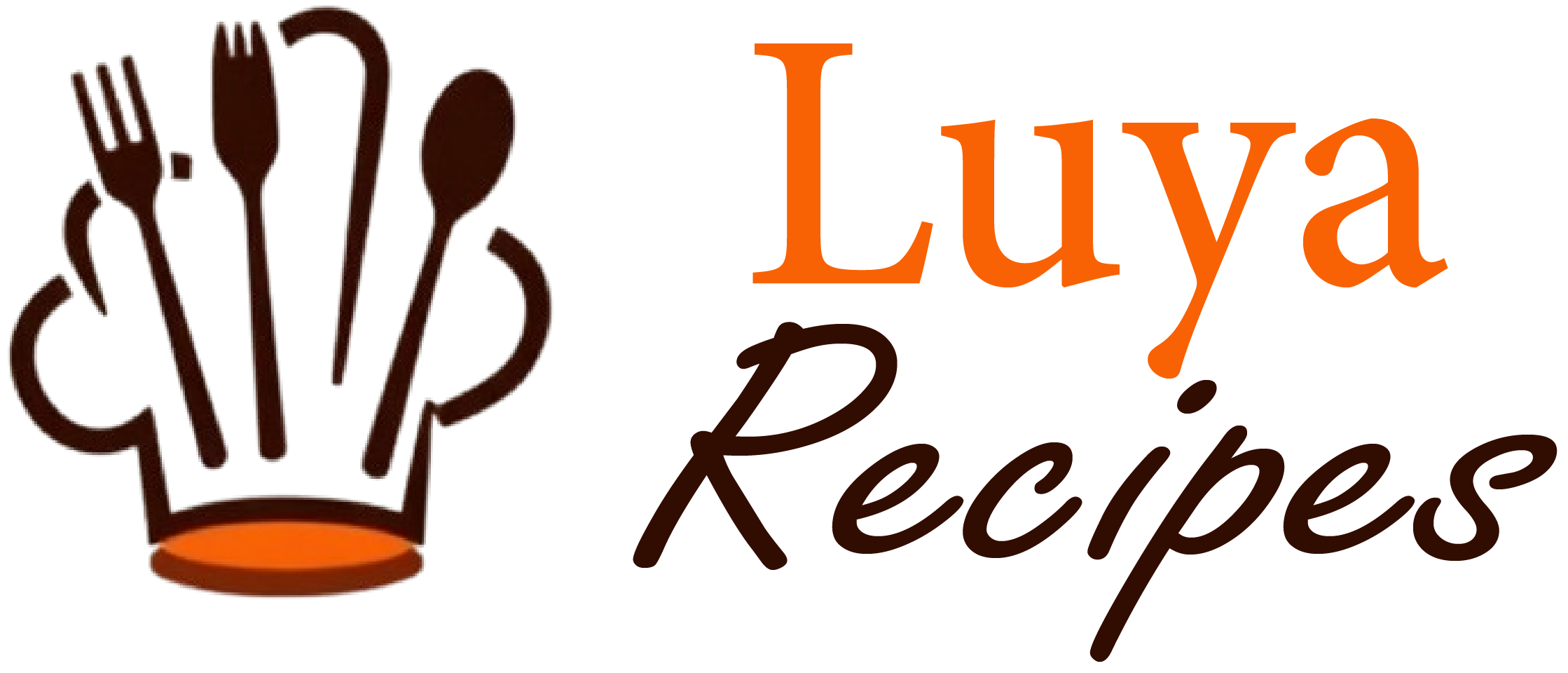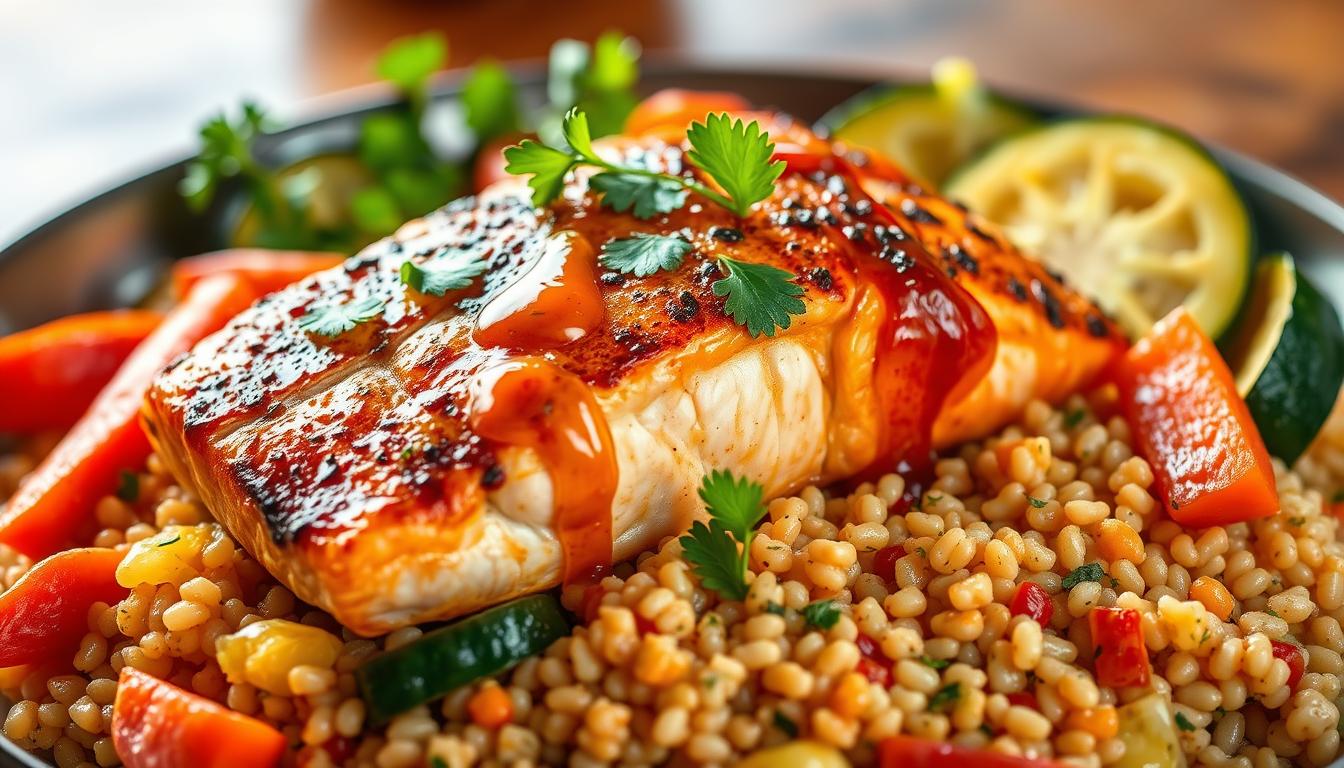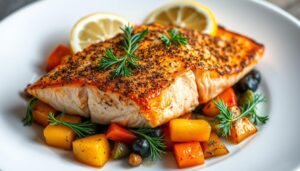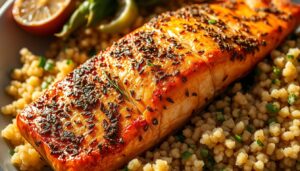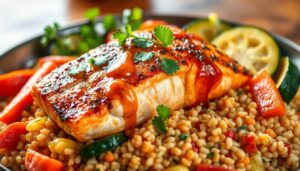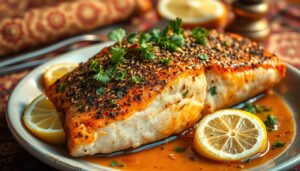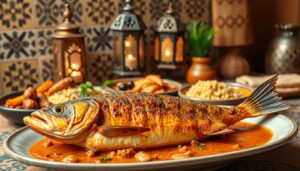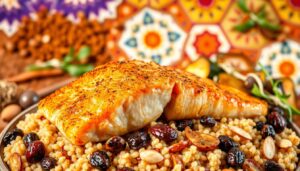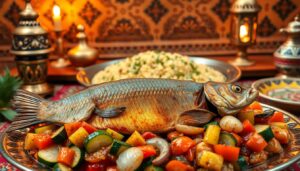Every Shabbat dinner, my grandmother’s kitchen was a sensory paradise. It was filled with the tantalizing aromas of a Moroccan salmon recipe kosher that had been passed down for generations. The sizzling sounds and vibrant colors of spices told a story of rich cultural heritage.
A Moroccan salmon recipe kosher is more than just a meal—it’s a culinary journey that connects generations. Your kitchen can become a gateway to an authentic Sephardic Jewish experience. Every bite of this flavorful dish transports you to the bustling markets of Marrakech.
Whether you’re a seasoned home cook or a curious food enthusiast, this Moroccan salmon recipe kosher promises to elevate your Shabbat dinner. It brings bold flavors and deep cultural significance to your table. Get ready to explore a recipe that will become a cherished tradition in your home.
Table of Contents
Introduction to Moroccan Salmon
Moroccan cuisine is a mix of vibrant flavors that turns simple ingredients into amazing meals. An easy Moroccan salmon recipe brings North Africa’s rich cooking traditions to your home. It makes for a healthy and tasty dinner.
The Essence of Moroccan Cuisine
Moroccan cooking is known for its bold spices and complex tastes. It combines Berber, Arabic, and Mediterranean flavors, making dishes that excite your taste buds. A healthy Moroccan salmon recipe captures this by using:
- Aromatic spices like cumin and paprika
- Fresh herbs such as cilantro and parsley
- Vibrant citrus elements
- Slow-cooking techniques that develop deep flavors
Benefits of Cooking Salmon
Salmon is a nutritional superstar, perfect for a healthy Moroccan salmon recipe. It’s full of omega-3 fatty acids and high-quality protein. Salmon offers many health benefits:
- Supports heart health
- Promotes brain function
- Provides essential nutrients
- Helps reduce inflammation
Discover how a simple Moroccan-inspired salmon dish can transform your weeknight dinner into a culinary adventure!
Key Ingredients for Moroccan Salmon
Explore the vibrant world of moroccan cuisine with a special selection of ingredients. These ingredients turn a simple salmon dish into a memorable culinary adventure. The secret to a flavorful kosher salmon recipe is in its mix of spices and fresh parts.
Essential Spices that Define Moroccan Flavors
Your journey into moroccan cuisine starts with a special spice collection. This collection adds depth and complexity to the salmon. The main spices are:
- Paprika – adds warm, rich color and subtle sweetness
- Cumin – provides earthy, robust undertones
- Coriander – offers a citrusy, slightly nutty flavor
- Cinnamon – contributes a gentle, aromatic warmth
Fresh Ingredients that Elevate Your Salmon
To make a true flavorful kosher salmon recipe, you need fresh, top-quality ingredients. These ingredients enhance the fish’s natural taste:
- Garlic – minced for intense flavor
- Fresh lemon – for bright, zesty notes
- Ripe tomatoes – adding natural sweetness
- Herbs like cilantro and mint – for fresh, vibrant garnishing
Together, these ingredients make a salmon dish that truly captures the essence of moroccan cuisine. It offers an unforgettable taste experience right on your plate.
Preparing Salmon for Moroccan Dishes
Starting with salmon preparation is key to making tasty kosher fish recipes. To make a simple Moroccan salmon dish, you need to clean, cut, and marinate the fish right.
Preparing salmon for Moroccan dishes needs careful steps. These steps make your cooking better. Professional chefs say the right prep turns a simple fish into a special meal.
How to Properly Clean and Cut Salmon
Here’s how to prepare salmon for your Moroccan dish:
- Rinse the salmon under cold water
- Pat dry with paper towels thoroughly
- Remove any visible bones using tweezers
- Cut salmon into uniform portions for even cooking
- Trim excess fat for a cleaner presentation
Marinating Tips for Maximum Flavor
Marinating is key for a real Moroccan salmon dish. Your marinade should mix spices that go well with the fish’s taste.
- Mix olive oil with harissa paste
- Add ground cumin, paprika, and garlic
- Squeeze fresh lemon juice for brightness
- Let salmon marinate for 30 minutes to 2 hours
- Avoid marinating longer to prevent texture breakdown
Pro tip: Always use fresh ingredients for the most vibrant kosher fish recipes!
By using these steps, you’ll make a Moroccan salmon dish full of flavor and true to its roots.
Popular Moroccan Salmon Recipes
Explore the vibrant world of Moroccan cooking with these tasty salmon recipes. They bring Moroccan flavors right to your kitchen. Salmon is a hit in modern kosher dishes, perfect for bold flavors.
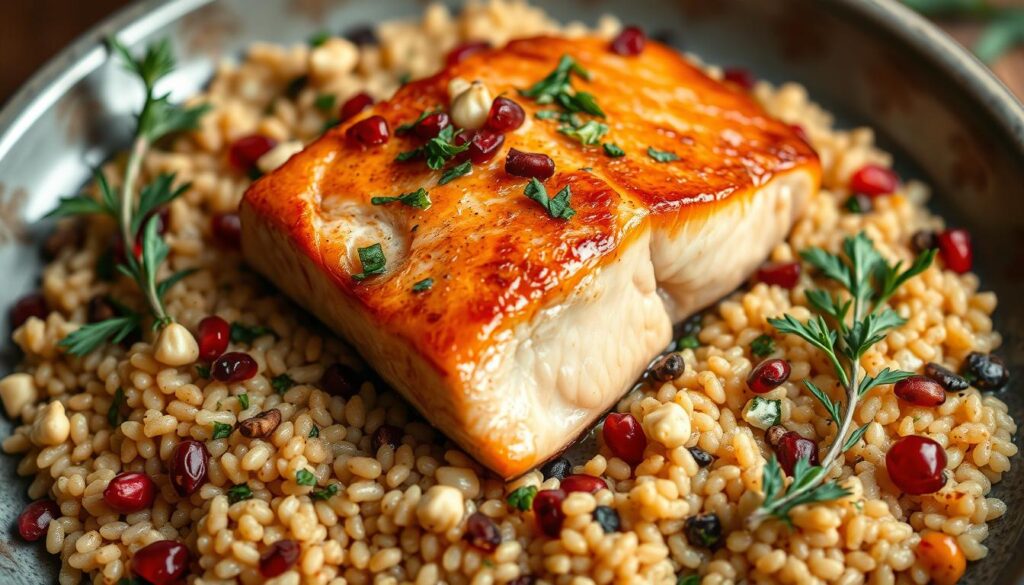
Moroccan salmon recipes show how versatile this fish is. Whether it’s a quick dinner or a special event, these recipes take you to Morocco’s markets.
Spicy Moroccan Salmon with Couscous
This kosher-style Moroccan salmon recipe is a mix of spices and textures:
- 3 lbs of fresh salmon
- 1/4 cup olive oil
- 6 garlic cloves, finely sliced
- 1 Tbsp cumin
- 2 Tbsp sweet paprika
- 1 large yellow onion, thinly sliced
- 1/4 cup preserved lemon juice
Authentic Moroccan cooking is all about layering flavors. Marinate the salmon with these spices, then cook for about 25 minutes. This makes the dish tender and full of flavor.
Grilled Moroccan Salmon Skewers
For a lighter Moroccan salmon dish, try these grilled skewers. They highlight the fish’s natural richness:
- Cut salmon into uniform chunks
- Marinate with harissa and olive oil
- Grill until slightly charred
- Serve with fresh herbs and lemon
Pro tip: Salmon absorbs Moroccan spices beautifully, making it a perfect protein for experimenting with traditional flavors!
These recipes show how versatile salmon is in Moroccan cuisine. They offer a delicious way to explore new culinary traditions in your kitchen.
Cooking Methods for Moroccan Salmon
Learning to cook Moroccan salmon is all about the right techniques. These methods help bring out the dish’s rich flavors. Whether you’re making a kosher version or trying something new, getting the cooking right is crucial.
Salmon is a delicate fish that needs careful handling. The FDA says to cook it to 145°F. But chefs often suggest stopping at 125°F for a tender finish.
Oven-Baking for Uniform Flavor Distribution
Oven-baking is great for even flavor in your Moroccan salmon. Here’s how to do it right:
- Preheat the oven to 400°F
- Use 4-5 ounce salmon fillets
- Cooking time ranges from 5-10 minutes depending on thickness
- Season with 1 teaspoon paprika and 1 teaspoon Baharat spice blend
Grilling for a Smoky Char
Grilling gives your kosher Moroccan salmon a smoky taste. The high heat creates a nice char while keeping it tender inside.
- Heat grill to medium-high (around 400°F)
- Brush salmon with 3 tablespoons extra virgin olive oil
- Grill for 3-4 minutes per side
- Watch carefully to prevent overcooking
Pro tip: Leave jalapeño seeds in for extra spice in your Moroccan salmon dish!
Remember, salmon cooks fast. Keep an eye on it to keep it moist and full of flavor.
Serving Suggestions for Moroccan Salmon
Creating the perfect meal with Moroccan salmon is more than just cooking the fish. It’s about picking sides and drinks that make the meal special. This adds to the fun of exploring Moroccan cuisine.
Perfect Side Dishes for Your Salmon
Choosing the right sides can make your Moroccan salmon dish even better. Here are some tasty options:
- Fluffy couscous with herbs
- Roasted vegetable medley
- Traditional Moroccan carrot salad
- Crusty artisan bread
- Lemony quinoa
Wine Pairings for Moroccan Dishes
Finding the right wine can make your Moroccan salmon meal even more enjoyable. For kosher wine, try these:
- Sauvignon Blanc – crisp and light
- Chardonnay – smooth and balanced
- Dry Riesling with subtle fruit notes
Make sure to pick kosher-certified wines. They should match the rich, spicy flavors of your Moroccan salmon.
Health Benefits of Salmon
Dive into the world of nutritional powerhouse salmon. It makes your healthy Moroccan salmon recipe a wellness-packed meal. Salmon is packed with essential nutrients, offering amazing health benefits.
Salmon is a nutritional champion, delivering health benefits in every bite. It has about 193 calories per serving. This fish provides a great nutritional profile that supports overall wellness.
Nutritional Powerhouse
Let’s explore the incredible nutritional breakdown of salmon:
- 22.6 grams of high-quality protein per serving
- 10.7 grams of total fat
- Minimal carbohydrates (0.4 g)
- Essential vitamins and minerals
Omega-3 Fatty Acids and Heart Health
The real magic of salmon lies in its omega-3 fatty acids. Nutritional research highlights that these healthy fats support heart health. The American Heart Association suggests eating fatty fish like salmon at least twice a week for heart health.
A typical serving contains up to 2,260 mg of omega-3 fatty acids, significantly contributing to daily recommended intake.
When preparing your kosher fish recipes, remember that salmon not only tantalizes your taste buds but also provides substantial nutritional value. Embrace this healthy Moroccan salmon recipe as a delicious pathway to improved well-being.
Exploring Moroccan Cuisine Beyond Salmon
Moroccan cuisine goes far beyond salmon. It offers a world of flavors that will excite your taste buds. Traditional Moroccan cooking is a rich mix of spices and stories of cultural heritage.
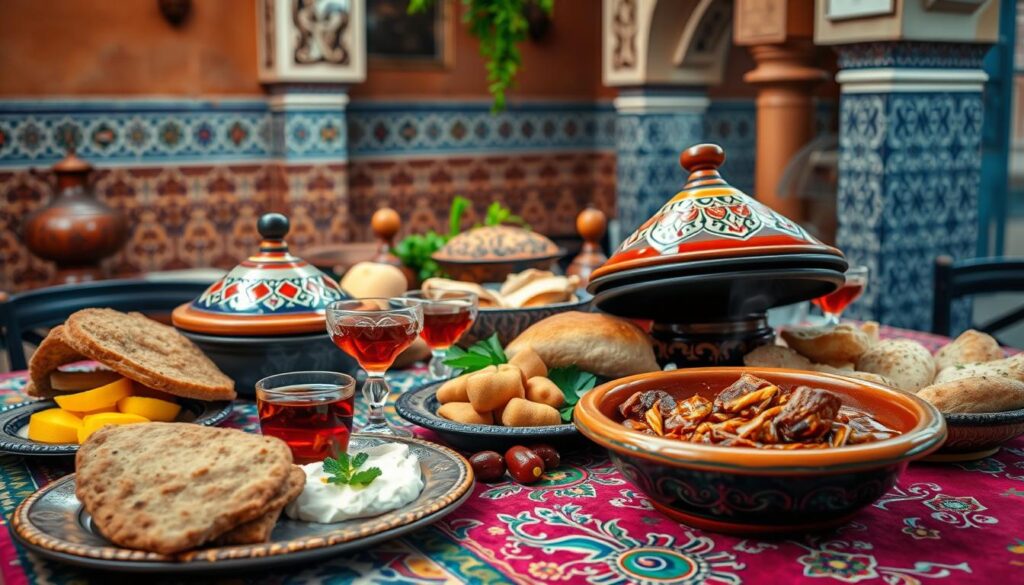
Explore the world of Moroccan cuisine with these delicious dishes. They show the depth and complexity of North African food:
- Braised Chicken with Green Olives and Lemons – A classic dish bursting with tangy and savory flavors
- Tender Moroccan Lamb Curry – Slow-cooked meat infused with aromatic spices
- Ras el Hanout Couscous – A fragrant grain dish featuring traditional spice blends
Traditional Dishes to Explore
Each traditional Moroccan cooking recipe has its own story. From the spicy Shakshuka to the hearty Moroccan Fish Cazuela, these dishes carry generations of wisdom.
Dietary Adaptations
Moroccan cuisine is very adaptable. You can easily make most recipes kosher, vegetarian, or gluten-free. Many dishes fit different diets without losing flavor.
Moroccan food is not just about eating—it’s about experiencing a culture through its incredible flavors and traditions.
Cultural Significance of Salmon in Moroccan Food
Salmon has become a key part of Moroccan food, blending flavors and cultures. It’s a star in many dishes, thanks to its versatility. This fish has been welcomed into Moroccan cooking, making it a favorite.
The story of salmon in Moroccan food is complex. Coastal areas have shaped how seafood is enjoyed. Each region adds its own twist to cooking, making it unique.
Historical Context of Seafood in Morocco
Morocco’s long coastline has helped shape its seafood traditions. The Mediterranean and Atlantic coasts offer a wealth of seafood. This has influenced how food is made and tasted.
- Coastal fishing communities developed unique preservation techniques
- Seafood became integral to Moroccan culinary identity
- Spice routes contributed to diverse flavor combinations
*Seafood is not just food in Morocco—it’s a cultural expression passed through generations.*
The Role of Salmon in Modern Moroccan Cooking
Today, Moroccan chefs are making new salmon dishes. They keep traditional methods but add their own twist. Sephardic Jewish communities love salmon, making it a big part of their food.
Salmon takes on Moroccan spices well, becoming a favorite. It’s used in marinades and spice blends, making it a hit in modern kitchens.
Tips for Hosting a Moroccan Salmon Dinner
Turning your dinner into a Moroccan celebration needs planning and creativity. A simple Moroccan salmon dish can be the highlight of a memorable night. It will delight your guests and take them to the vibrant world of Moroccan cuisine.
Hosting a kosher Moroccan salmon dinner is more than cooking a meal. It’s about creating a cultural experience that touches all senses.
Creating an Authentic Moroccan Atmosphere
Here’s how to set the stage for your dinner:
- Use rich, jewel-toned table linens in deep blues, reds, and oranges
- Display intricate Moroccan lanterns or tea glasses as centerpieces
- Play traditional Moroccan music softly in the background
- Incorporate brass or copper serving dishes for an authentic touch
Crafting the Perfect Menu
When planning your menu, balance is crucial. Your simple Moroccan salmon dish should be paired with carefully chosen sides and appetizers:
- Start with a light mezze platter featuring hummus and olives
- Serve the kosher Moroccan salmon as the main course
- Pair with herbed couscous or roasted vegetables
- Finish with mint tea and a traditional Moroccan dessert
By focusing on these details, you’ll create a memorable dining experience. It will celebrate Morocco’s rich culinary traditions.
Conclusion: Enjoying Moroccan Salmon at Home
Exploring a flavorful kosher salmon recipe can make your kitchen exciting. Moroccan cuisine adds a special twist to simple seafood, turning it into a memorable meal. Your cooking journey starts now, in your own kitchen.
An easy Moroccan salmon recipe can become your go-to dish. The techniques and spices we talked about will help you make meals like a pro. Remember, cooking is all about being creative and making things your own. Feel free to change spices or ingredients to match your taste.
Fresh ingredients are key to amazing seafood dishes. Choose high-quality, sustainable salmon from trusted markets. Your dedication to quality will make every bite special.
Cooking is about connecting with flavors, traditions, and loved ones. Sharing a delicious Moroccan salmon meal can make dinner unforgettable. Dive into the adventure, trust your taste, and enjoy the rich traditions of Moroccan cooking.
FAQ
Is Moroccan salmon a traditional Moroccan dish?
Salmon isn’t a common find in Morocco. But, chefs have mixed Moroccan spices with global ingredients. This creates a tasty salmon dish that shows off Moroccan flavors.
How can I ensure my Moroccan salmon is kosher?
For kosher Moroccan salmon, start with kosher salmon. Make sure all tools and surfaces are kosher. Follow kosher rules and use kosher spices and ingredients.
What are the key spices used in Moroccan salmon recipes?
Key spices are cumin, coriander, paprika, turmeric, and harissa. These spices give Moroccan salmon its unique, warm flavor.
How long should I marinate the salmon?
Marinate the salmon for 30 minutes to 2 hours. Don’t marinate too long to keep the fish’s texture. Always marinate in the fridge for safety.
What are the best side dishes to serve with Moroccan salmon?
Serve with couscous, roasted veggies, Israeli salad, and tabbouleh. These sides balance the salmon’s rich flavors and make for a healthy meal.
Can I prepare Moroccan salmon in advance?
Prepare the marinade and marinate the salmon ahead of time. But, cook it just before serving for the best taste and texture.
What are the health benefits of eating Moroccan salmon?
Salmon is packed with omega-3s, protein, and vitamins D and B12. Moroccan spices add anti-inflammatory benefits and help with digestion.
Can I make a vegetarian version of this dish?
You can use tofu, tempeh, or veggies like cauliflower or eggplant. The Moroccan spice blend works well with these alternatives.
What cooking methods work best for Moroccan salmon?
Oven-baking and grilling are both great. Baking ensures even flavor, while grilling adds a smoky taste. Choose based on your kitchen and preference.
How spicy are traditional Moroccan salmon recipes?
You can adjust the spice level to your liking. Recipes can be mild or spicy, depending on harissa or chili use. Adjust to your taste.
Source Links
- Chill Out This Shavuot with Easy No-Bake Desserts – Kosher.com – https://www.kosher.com/article/chill-out-this-shavuot-with-easy-no-bake-desserts/
- Bastila (Moroccan Chicken Pie) – https://www.seriouseats.com/bastila-moroccan-chicken-pie-recipe-8731421
- Salmon – Melissa Trainer – https://melissatrainer.com/category/salmon/
- Moroccan Fish – Something Nutritious – https://somethingnutritiousblog.com/moroccan-fish/
- 20-Minute Salmon Chraimeh (Fish Braised in Spicy Tomato Sauce) – Well Seasoned Studio – https://www.wellseasonedstudio.com/salmon-chraimeh/
- Spicy Moroccan Baked Fish – https://dishingouthealth.com/spicy-moroccan-baked-fish/
- Jewish Moroccan Fish Chraime Recipe – https://marocmama.com/moroccan-jewish-fish-chraime-recipe/
- Moroccan Fish Pastilla – A Showstopping Dish for Any Occasion – Kosher Cowboy – https://koshercowboy.com/fish-pie-pastilla/
- A Taste of Casablanca for Passover – Sephardic Spice Girls – https://sephardicspicegirls.com/moroccan-fish-a-taste-of-casablanca-for-passover/
- Sheet Pan Salmon | The Mediterranean Dish – https://www.themediterraneandish.com/sheet-pan-salmon-and-vegetables/
- Air Fryer Salmon Bites (with Za’atar) – https://www.hungrypaprikas.com/air-fryer-salmon-bites/
- Salmon on Lemon Polenta with Vegetables – https://moretimeatthetable.com/2024/06/10/salmon-on-lemon-polenta-with-vegetables/
- Moroccan Fish in Tomato Sauce (Chraime) – Kosher Cowboy – https://koshercowboy.com/moroccan-fish-in-tomato-sauce/
- Non-Spicy Moroccan Fish Recipe – https://www.honeyspantry.com/moroccan-mullet-fish-non-spicy/
- 30 Best Salmon Recipes – https://www.feastingathome.com/salmon-recipes/
- PARMESAN CRUSTED SALMON CAESAR SALAD – https://chewingthefat.us.com/2024/11/parmesan-crusted-salmon-caesar-salad.html
- Spicy Moroccan-Inspired Harissa Carrot Salad – https://www.justmaikacooking.com/recipes/harissa-carrots-salad/
- Dining at Balaboosta with an Expert – https://kosherlikeme.com/dining-at-balaboosta-with-an-expert/
- Chraime Salmon Bites | Aish – https://aish.com/chraime-salmon-bites/
- Chraime Recipe: Tunisian Fish Dish With Explosive Flavors – https://balancedkitchen.com/2024/06/chraime-recipe/
- In the Kitchen with the Grande Dame of Jewish Cooking – https://www.newyorker.com/magazine/2024/04/15/joan-nathan-the-grande-dame-of-jewish-cooking
- What Shall I Serve For My Shabbos Day Meal? – Between Carpools – https://betweencarpools.com/shabbos-day-meal/
